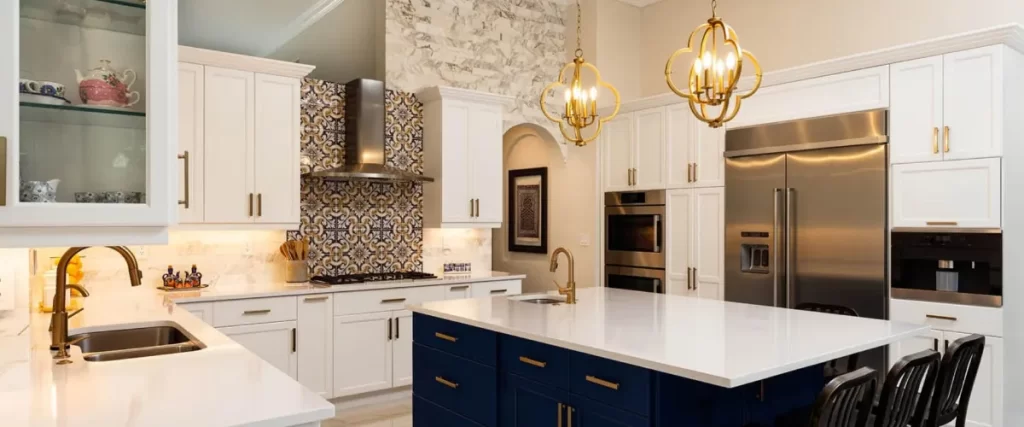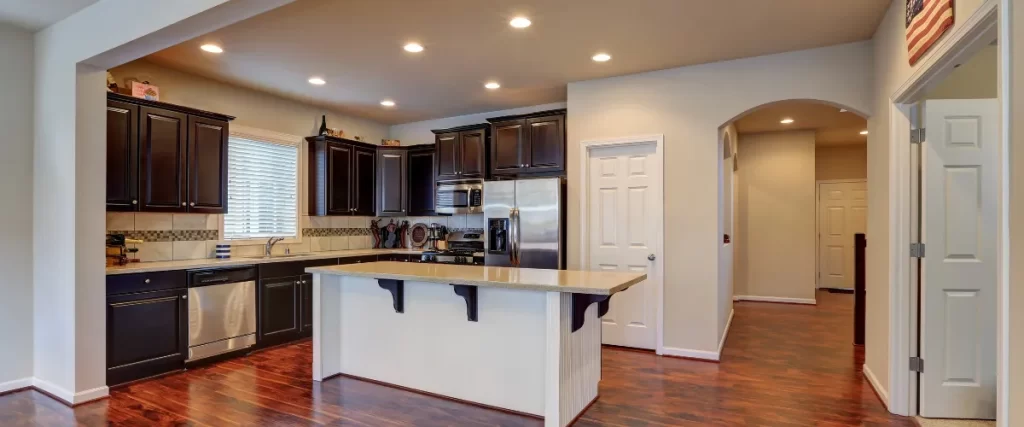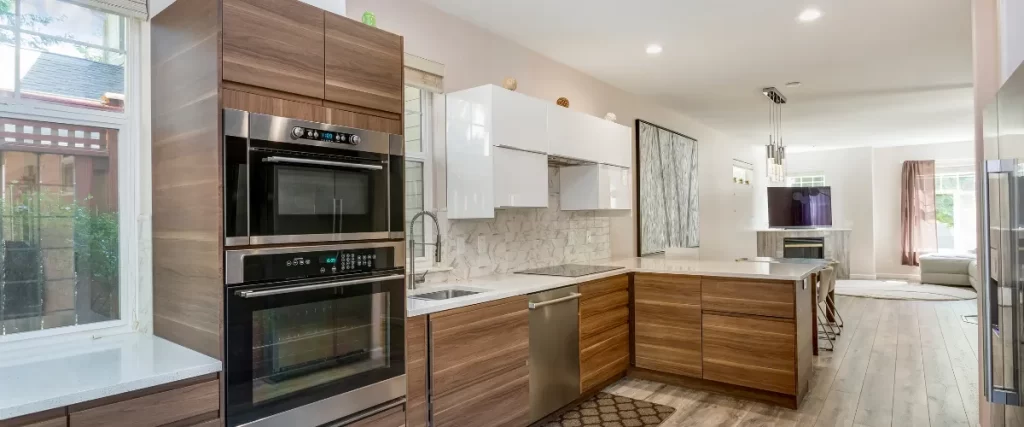If you’re a Bellevue homeowner, you know how the Nebraska climate can really put a strain on your energy bills, especially during those hot summer months and freezing winters. While you can’t control the weather, there’s a lot you can do to ensure your kitchen remains energy-efficient, helping to lower those utility bills and keep your home comfortable year-round.
Whether you’re renovating an outdated kitchen or simply making small upgrades, remodeling with energy efficiency in mind can make a huge difference in your energy consumption.
In this comprehensive guide, we’ll show you how to remodel your kitchen to not only look stunning but also become more energy-efficient.
From installing smart appliances to improving insulation and lighting, we’ll cover all the crucial aspects of a kitchen remodel that will help Bellevue homeowners reduce energy costs and minimize their environmental impact. Let’s dive into the exciting world of energy-efficient kitchen remodeling.

Why Focus on Energy Efficiency in Your Kitchen?
The kitchen is one of the most energy-intensive rooms in your home. Between cooking, heating water, and using appliances, the energy consumption can add up quickly. For homeowners in Bellevue, where temperatures can fluctuate dramatically, it’s even more important to ensure that your kitchen is optimized for energy use.
Not only does energy efficiency reduce your carbon footprint, but it also provides immediate savings on monthly utility bills—something every homeowner can appreciate.
With advancements in technology, energy-efficient appliances and materials have become more accessible, affordable, and stylish. By making the right choices, your kitchen remodel can provide long-term value, while also enhancing the functionality and comfort of your home.
Key Areas to Focus on When Remodeling for Energy Efficiency
When considering an energy-efficient kitchen remodel, there are several areas to focus on to ensure you’re getting the best value for your investment. Here are the most important components to consider:
1. Energy-Efficient Appliances
The appliances you use daily—your refrigerator, stove, dishwasher, and microwave—are often the biggest culprits when it comes to energy consumption. In fact, the average American household spends about 13% of its total energy usage on kitchen appliances. Switching to ENERGY STAR-rated appliances is one of the most effective ways to reduce your energy bills.
- Refrigerators: ENERGY STAR refrigerators use at least 10% less energy than standard models, offering significant savings over time. Look for models that have a good energy rating and feature energy-saving options such as automatic defrost and LED lighting.
- Dishwashers: Modern dishwashers have become significantly more efficient, using less water and energy per load. ENERGY STAR models are designed to save both energy and water, helping you save money in the long run.
- Ovens and Cooktops: Consider installing an induction cooktop, which uses magnetic fields to directly heat cookware, instead of relying on burners that waste heat. Induction cooking is faster and more energy-efficient than traditional electric or gas ranges.
- Microwaves: Using a microwave instead of an oven can save both time and energy, as they use less power to heat food quickly.
2. Efficient Lighting Choices
In any kitchen remodel, lighting plays a huge role. Poor lighting can lead to inefficient energy use, especially if you’re relying on incandescent or fluorescent bulbs. Instead, opt for LED lighting, which uses up to 75% less energy and lasts 25 times longer than traditional bulbs.
Best Lighting Tips for Kitchen Remodels:
- Install under-cabinet LED lights for focused task lighting.
- Use dimmers to control the intensity of the light based on time of day.
- Replace pendant lights with LED versions to save energy without sacrificing style.
3. Improved Insulation and Ventilation
Your kitchen is connected to other areas of your home, so ensuring that it’s well-insulated is essential for maintaining energy efficiency. If your kitchen is drafty, the HVAC system will have to work harder to maintain a comfortable temperature, leading to higher energy costs.
- Insulate windows and doors: Choose energy-efficient windows with double glazing and ensure that doors are sealed properly to prevent drafts.
- Upgrade your range hood: If your kitchen has poor ventilation, the range hood can help circulate air, preventing the buildup of heat and moisture. An efficient range hood can help reduce the need for air conditioning in the summer months.
4. Water Efficiency
Your kitchen likely uses a significant amount of water, whether it’s for cooking, cleaning, or dishwashing. Upgrading to water-efficient appliances, faucets, and fixtures can significantly lower water usage, which also impacts your utility bills.
- Water-efficient faucets: Install low-flow faucets that reduce water wastage without sacrificing water pressure. This small change can make a big difference in your water bill.
- Dishwasher and water heater: Consider a dishwasher with water-saving technology and an energy-efficient water heater to ensure minimal energy consumption when cleaning dishes.
5. Sustainable Materials for Countertops, Cabinets, and Flooring
When remodeling your kitchen, consider using sustainable materials that are not only eco-friendly but also energy-efficient in the long term. From countertops to flooring, there are several materials that can help reduce energy use and keep your home environmentally friendly.
- Recycled glass countertops: Made from reclaimed materials, these countertops are a stylish and sustainable option that can also help reduce the environmental impact of your remodel.
- Bamboo flooring: Bamboo is an incredibly sustainable material that grows quickly and doesn’t require much energy to produce. It’s a great eco-friendly choice for kitchen flooring.
- Reclaimed wood cabinets: Instead of opting for new wood, consider reclaimed wood for cabinets and shelving. This not only reduces the need for new materials but also adds a rustic touch to your kitchen.

Top Manufacturers for Energy-Efficient Kitchen Appliances
Choosing energy-efficient kitchen appliances is a key component of any remodel. Here are some top manufacturers that offer a variety of products designed to reduce energy consumption in the kitchen:
Best Manufacturers for Energy-Efficient Kitchen Appliances
- GE Appliances
Known for their ENERGY STAR-rated refrigerators, dishwashers, and ovens, GE offers a wide range of energy-efficient options. - Whirlpool
Whirlpool is a leader in eco-friendly kitchen appliances, offering a variety of ENERGY STAR-certified refrigerators, washers, and dishwashers. - Bosch
Bosch’s dishwashers are some of the most energy-efficient on the market, known for their quiet operation and low water consumption. - Samsung
Samsung offers innovative appliances that combine energy efficiency with modern design, featuring smart technology to optimize energy use. - KitchenAid
KitchenAid’s premium appliances are built to perform efficiently, providing high energy savings with stylish designs.
Frequently Asked Questions (FAQ)
How can I lower my kitchen’s energy bills without a full remodel?
There are several simple updates you can make to reduce your kitchen’s energy consumption. Start by switching to LED lighting, using energy-efficient appliances, and sealing any drafts around windows and doors.
Are there any tax incentives or rebates for energy-efficient kitchen remodels in Bellevue?
Yes! Nebraska offers various incentives for homeowners who make energy-efficient upgrades. Check out the Nebraska Energy Office for more information on available programs and rebates.
How much can I expect to save by remodeling my kitchen for energy efficiency?
The savings will vary depending on the upgrades you choose, but many homeowners report savings of 10% or more on their energy bills after installing energy-efficient appliances and making insulation upgrades.

Conclusion
Remodeling your kitchen for energy efficiency is a smart investment that not only enhances the look and feel of your home but also helps you save money on your utility bills.
By choosing energy-efficient appliances, updating lighting, improving insulation, and opting for sustainable materials, Bellevue homeowners can reduce energy consumption while making their kitchens more functional and stylish.
If you’re ready to start your kitchen remodel, contact us at (402) 661-0910. We’re here to help you design an energy-efficient kitchen that fits your needs and your budget.
